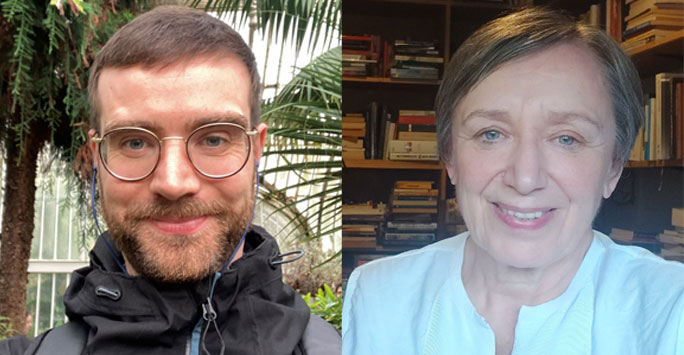Researchers in Focus: Dr Alex Coupe and Dr Pauline Hadaway
Posted on: 27 June 2024 by Dr Alex Coupe and Dr Pauline Hadaway in 2024 Posts

Meet Dr Alex Coupe, Lecturer in Theatre and Drama Studies, and Dr Pauline Hadaway, researcher in in cultural policy and heritage, and learn more about their work exploring the arts-based peacebuilding taking place in Northern Ireland.
Listen to Pauline and Alex as they talk about their work in this Researcher in Focus podcast:
Though we both specialise in slightly different areas – Pauline in cultural policy and heritage studies and Alex in theatre and performance studies – together we research the arts-based peacebuilding in Northern Ireland. We first worked together as part of the 2017-2021 research project The Art of Reconciliation, based at the University of Liverpool’s Institute of Irish Studies, which explored the impact of cultural activities that foster reconciliation following the 1998 Good Friday/Belfast Agreement.
The initial research project involved extended conversations and creative engagements with over 40 arts managers, funders, practitioners, and audience members in Northern Ireland.
We found that, despite a general increase in public funding for community and applied arts, there exists a significant absence of accessible information recording the development, production and experience of artistic practices for peacebuilding, with valuable historical and cultural material consigned to hard-to-reach repositories, the back rooms of arts organisations, and the memories of participants and practitioners.
This is a problem that can be traced partly to the financial precarity of arts organisations, which have little time or means to archive their work. The competitive and piecemeal nature of the funding system requires arts organisations to manage different funding sources and processes of audit, absorbing already scant resources for documentation.
Though ‘flagship’ projects might be preserved in the North’s more prominent museums, galleries, and libraries, applied and community arts tend to be more difficult to archive and are generally regarded as less appealing to international visitors. Over time, such problems have created significant structural barriers to building the kind of coherent record needed to provide a comprehensive account of the arts’ contribution to peacebuilding.
Working in partnership with the Arts Council of Northern Ireland (ACNI) and with key arts and community stakeholders, our current HIAA-funded project takes the first steps towards addressing these long-standing weaknesses as they impede the dissemination of these valuable cultural resources for study and development.
Recovering the Art of Reconciliation builds upon the 2017-2021 project in two main ways. Firstly, we have constructed a ‘proof of concept’ database of arts-based peacebuilding to which practitioners and cultural organisations can submit information on historic projects. The website (https://afr-database.org/coming-soon/) will go ‘live’ in July 2024 and is due to be launched officially in Belfast and Liverpool.
Secondly, we have proposed practical solutions to remedy deficiencies in the Arts Council’s current funding and evaluation processes. We are therefore trying to establish an inter-institutional Network for Arts-Based Peacebuilding to support knowledge exchange between practitioners, researchers, and commissioning bodies. Another short-term aim is to create toolkits for practitioners on ethical arts-based peacebuilding and evaluation methodologies.
Our long-term goal is to expand our ‘proof of concept’ to undertake a comprehensive recovery of art-based peacebuilding practices, ensuring that they can be researched, historicised, responsibly curated, and shared online. This Archive of Arts-Based Peacebuilding will include digitised objects and documents, something we don’t currently have the funds to do. The process of gathering this material will support further academic research into the history and theory of applied and community arts in Northern Ireland.
In time, we hope this material will form a vital resource for artists and community organisations as they grapple with the complex legacies of the ‘Troubles’ and the North’s constitutional futures.
Keywords: Researcher in Focus.